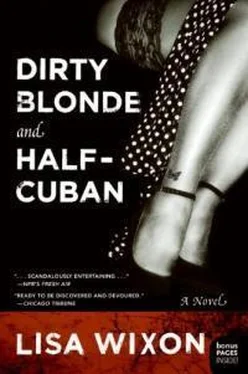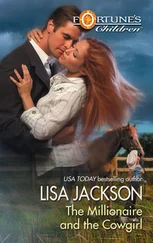Lisa Wixon - Dirty Blonde and Half-Cuban
Здесь есть возможность читать онлайн «Lisa Wixon - Dirty Blonde and Half-Cuban» весь текст электронной книги совершенно бесплатно (целиком полную версию без сокращений). В некоторых случаях можно слушать аудио, скачать через торрент в формате fb2 и присутствует краткое содержание. Жанр: Современная проза, на английском языке. Описание произведения, (предисловие) а так же отзывы посетителей доступны на портале библиотеки ЛибКат.
- Название:Dirty Blonde and Half-Cuban
- Автор:
- Жанр:
- Год:неизвестен
- ISBN:нет данных
- Рейтинг книги:4 / 5. Голосов: 1
-
Избранное:Добавить в избранное
- Отзывы:
-
Ваша оценка:
- 80
- 1
- 2
- 3
- 4
- 5
Dirty Blonde and Half-Cuban: краткое содержание, описание и аннотация
Предлагаем к чтению аннотацию, описание, краткое содержание или предисловие (зависит от того, что написал сам автор книги «Dirty Blonde and Half-Cuban»). Если вы не нашли необходимую информацию о книге — напишите в комментариях, мы постараемся отыскать её.
Dirty Blonde and Half-Cuban — читать онлайн бесплатно полную книгу (весь текст) целиком
Ниже представлен текст книги, разбитый по страницам. Система сохранения места последней прочитанной страницы, позволяет с удобством читать онлайн бесплатно книгу «Dirty Blonde and Half-Cuban», без необходимости каждый раз заново искать на чём Вы остановились. Поставьте закладку, и сможете в любой момент перейти на страницу, на которой закончили чтение.
Интервал:
Закладка:
“ Oye,I’ve heard you found your father’s address,” he says, taking back his chain. “Camila told me.”
“I’m so sorry,” I say quietly, unable to meet his eyes. “I should have told you about my jineteando.”
“It’s incredible. That you won’t go meet your family.”
“Modesta says the Russians roughed you up.”
“After everything you’ve been through to find them.”
“Perdóname,”I say. Then I stand on my toes and impulsively wrap my arms around him and, finally, he reciprocates, and the way his body slowly relaxes into mine suggests I may have been forgiven.
“ Mami,why don’t you come home with me tonight,” he says, his voice low and soft. “Tomorrow I’ll take you in the Chevy to your casa,to see if it’s your family. You shouldn’t go alone.” I think of the entrance, of my father’s face when he sees his jineteradaughter with a jineteroboy pull up in a jineterismoChevy.
Well, I figure, José Antonio has got to know the truth. And I realize then it’s what I’m hiding. There’s a fear my father won’t respect me for what I did to find him, won’t understand what I gave up on the off-chance I’d track him down so many years later.
Last year, when I began searching for my father in Havana, I ran into Dr. Ruth, the sex guru, in the bar of the Hotel Floridita, during a jazz jam. She said hello, but there wasn’t much to hear, with all the music. Dr. Ruth was surrounded by sexy young men and women drinking mojitos. They had no clue who she was. Yet I’m certain, from the pale tourists on their arms, she knew who they were.
I didn’t ask her what she thought of what she saw. But I think she would have understood that there’s nothing new about sex as the devise du paysfor luxuries; that after the war French girls fucked American GIs for stockings and canned fruit; that some girls in New York won’t date a man unless he charters a Gulfstream G5.
She might have said that sex isn’t just currency. That it’s also communication; it reflects the hopes of who we are, or what we yearn to become. In Cuba, jineterismoisn’t just for stockings. It’s about throwing a penny down the well, and wishing. A middling tourist, defeated at home, is anew in Cuba, virile and potent, with a pocketful of cash. A peasant girl, with a little love, transforms into the sophisticated charge of a heady man. Dr. Ruth would say there’s nothing new about that.
It’s because of my new complex relationship with sex that I can’t sleep with the one man I have feelings for: Rafael. He understands, he says, and we just hold each other all night and, in the morning, I keep my promise to him. The one where I agree to shunt my fears and knock on the door of the house at Calle M. To see if, indeed, it holds a history that belongs to me.
So I pull up in the Chevy and the kids squeal when I catch the mango—fly ball!—and I step onto the porch. The door is open, and voices beckon me inside, into the house filled with liveliness. With Rafael’s hand on my back, Tito at my feet, and my heart in my mouth, I blurt out my story to the first friendly face I see, and I repeat it again, upon request, and then there’s more astonishment and rapid-fire Spanish and hoots and laughter. Then come the hugs and I realize something is happening, though I’m not sure what, and I keep answering questions, yes I was born here, yes my mother was a Yankee, yes she was the blonde with a quick laugh, and it all starts to make sense, to them at least, to my uncles and aunts and cousins, and when I hear myself ask about my father, there is silence.
“He’s gone,” says the oldest woman, finally speaking.
It figures, I think, putting my hands to my face. I can’t cry, because the room is jumbling around me with embraces and smiles, and now the neighbors are coming in, and it’s hot, the curse of latitude.
Rafael tugs at my hair. “Listen,” he says.
“My son is gone, mi niña,” says the old woman, gathering me in her arms. This must be my grandmother, I think, feeling her loose flesh cover mine.
“But he’ll call on Sunday. He always calls on Sunday from Miami.”
59
O n the planeto Washington, my mother whispers good-bye to Cuba and José Antonio forever. With me asleep in her lap, she reasons that her romantic urges had to come secondary to the welfare of her child, and she tries to leave it at that. She remembers gently squeezing John’s hand. With rare tears welling, John tells her he can’t live without her, and embraces my mother tightly as they nose through turbulence.
Shortly after we arrive in Washington, a dozen Cubans break into the Peruvian embassy in Havana and demand asylum. Rather than turn over the offenders to the Cuban government, the Peruvians relent and issue exit visas.
Within hours—Radio Bemba alight with the news—nearly eleven thousand Cubans join their forerunners at the Peruvian embassy. In a chaos few can forget, asylum-seekers climb gates and walls, ram the entryway, and camp atop the embassy, all demanding their ticket out.
My mother hangs on the story, disbelieving the irony of wishing to return to a country the cubanosare desperate to leave.
Twenty-seven miles west of Havana, in the Port of Mariel, a natural bay and former British naval station, officials quietly clear cargo ships from loading docks. Shortly thereafter, the port is announced open to all who wish to leave from it.
Boats arrive immediately from Floridian shores, and captains and crew rescue their relatives and friends. Those without norteamericanocontacts scramble to construct makeshift flotations. These rickety contraptions are heaved to sturdier craft. A flotilla is formed. Together the weak and the strong, the fiberglass and the scrap wood, tie their lines together and make the notoriously deadly crossing.
John briefs the administration in Washington. Over the ensuing months, he watches as nearly 120,000 Cubans ply the Florida Straits. But John is unsettled. Handling the exodus from the U.S. Interests Section in Havana—instead of from his new base in Washington—would have made his career. He silently blames my mother, or so she perceives, and the foundation of her decision begins to crumble.
Perhaps she had made a mistake in not following the longings of her heart.
What my mother would never know is that José Antonio, in keeping his promise to his daughter, would take his few possessions, leave behind his mother, sisters, brothers, nieces, and nephews, and a respectable career, and jump on a Coast Guard ship bound for La Yuma.
60
W hen I wassmall, my father would play with me at this pastel, rambling house on Calle M. Everyone knew me then. Photographs of us are still here, but are too delicate to touch without them crumbling.
When my mother and stepfather packed up to return home, José Antonio reported to his family he couldn’t argue with his lover’s decision. He thought it was best his daughter go to the United States, so she wouldn’t have to live like a Cuban.
What I learn from my grandmother, in the snippets she’ll disclose, is how José Antonio left for the U.S. shortly after our departure. He believed la familiato be the most important thing in the world. He wanted to know his daughter. And once he was in the U.S., sending money to his family back home became his other priority.
How long had he been looking for me, I wonder? Had he turned up on our doorstep in Washington? Had my mother shunned him? Could he have known of our long foreign assignments, an aching in his heart awaiting our return? At night, I sift through my mother’s diaries, trying to put the pieces together. But in them, I find nothing to graft.
My grandmother, my abuela,refuses to answer most questions directly. As do my uncles, aunts, and numerous cousins. Their dancing eyes hint of sorrow when I talk about my mother and José Antonio, or the twenty-three years of longing they’ve felt in his absence. No one will tell me why José Antonio has never returned to his homeland to visit his loving kin.
Читать дальшеИнтервал:
Закладка:
Похожие книги на «Dirty Blonde and Half-Cuban»
Представляем Вашему вниманию похожие книги на «Dirty Blonde and Half-Cuban» списком для выбора. Мы отобрали схожую по названию и смыслу литературу в надежде предоставить читателям больше вариантов отыскать новые, интересные, ещё непрочитанные произведения.
Обсуждение, отзывы о книге «Dirty Blonde and Half-Cuban» и просто собственные мнения читателей. Оставьте ваши комментарии, напишите, что Вы думаете о произведении, его смысле или главных героях. Укажите что конкретно понравилось, а что нет, и почему Вы так считаете.












